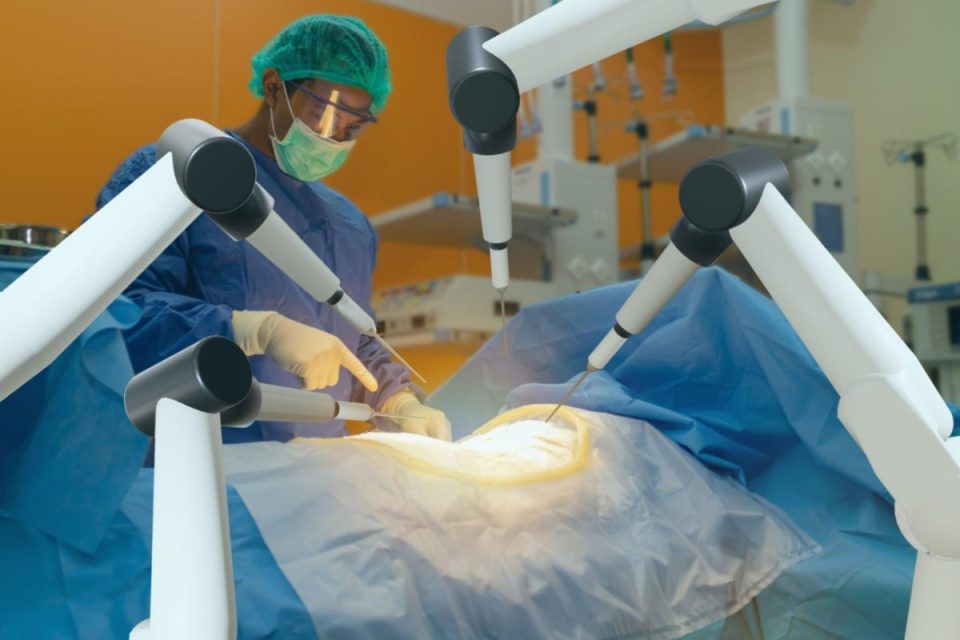Neurosurgery: The integration of artificial intelligence (AI) and robotics into neurosurgery has initiated a new era of medical precision.
AI’s capacity for processing complex data has become a cornerstone in preoperative planning, enabling surgeons to simulate various surgical approaches and anticipate outcomes with remarkable accuracy.
This level of detail in planning is critical for tailoring treatments to the individual needs of patients, ensuring that each surgical intervention is as effective as possible.
Robotics has complemented AI’s analytical prowess by providing a physical extension of the surgeon’s capabilities.
Robotic systems, with their unparalleled steadiness and precision, allow for the execution of surgical manoeuvres that would be challenging, if not impossible, for the human hand alone.
The result is a significant reduction in the invasiveness of procedures, which translates into less traumatic surgery, reduced hospital stays, and faster recoveries for patients.
Table of Contents
Educating the Neurosurgeons of Tomorrow
The rise of AI and robotics has not only transformed the operating room but has also reshaped the landscape of neurosurgical education.
The traditional apprenticeship model is now enhanced by cutting-edge virtual reality (VR) simulations and comprehensive video tutorials.
These innovative tools provide trainees with a risk-free environment to develop their surgical skills, offering a level of interactivity and immersion that was previously unattainable.
In addition to VR, the availability of online surgical video libraries has become an indispensable educational resource.
These platforms, such as leading neurosurgeon Dr Timothy Steel’s video library, allow trainees and seasoned surgeons to visualise and learn from actual procedures.
They serve as a bridge between theoretical knowledge and practical application, showcasing the nuances of neurosurgical techniques and the integration of AI and robotics.
Ethical Considerations in the Technological Age
The ethical landscape of neurosurgery is complex and ever-evolving, especially with the introduction of AI and robotics.
The primary ethical concern revolves around patient trust—a foundational element of the patient-doctor relationship.
Surgeons must ensure that patients understand and are comfortable with the role that these advanced technologies play in their treatment.
Clear communication and transparency are essential in building and maintaining this trust.
Another ethical consideration is the need for surgeons to stay abreast of technological advancements.
As AI and robotics continue to develop, surgeons must commit to lifelong learning to remain proficient in their use.
This dedication to continuous education is crucial for providing the highest standard of care and for navigating the ethical implications of these rapidly evolving technologies.
The Future Unfolding: AI and Robotics in Neurosurgery
The future of AI and robotics in neurosurgery is not just promising; it is already unfolding before our eyes.
These technologies are constantly advancing, bringing forth new applications that refine surgical techniques, reduce operative times, and enhance patient outcomes.
In the not-too-distant future, we may witness AI algorithms providing real-time intraoperative guidance or even performing specific tasks autonomously, always under the watchful eye of a skilled neurosurgeon.
The broader implications of these technologies extend beyond the operating room. They represent a shift towards more data-driven, patient-centred care, which could revolutionise healthcare delivery as a whole.
With each technological breakthrough, the potential for improved diagnostics, personalised treatments, and better overall patient experiences grows.
A Global Collaboration: Sharing Knowledge and Innovations
The transformation of neurosurgery through AI and robotics is a testament to the power of global collaboration.
Surgeons from various countries contribute to the advancement of these technologies, sharing their knowledge and experiences.
This international exchange of ideas is vital for fostering innovation and ensuring that the benefits of AI and robotics are realised worldwide.
In Australia, contributions from surgeons like Dr Timothy Steel are helping to shape the future of neurosurgery.
Through scholarships, research, and international collaboration, Australian neurosurgeons are playing a key role in this global effort, ensuring that the field continues to progress and that patients everywhere have access to the best possible care.
Leveraging Social Media for Neurosurgical Innovation
Social media has become a pivotal force in shaping the landscape of medical communication and education, particularly within the neurosurgical community.
Platforms like Twitter are no longer just venues for casual social interaction.
Neurosurgeons are increasingly turning to these platforms to host case-based discussions, share insights, and collaborate on complex conditions, as evidenced by this study on social media’s role in neurosurgery.
Engaging with peers over discussions on new research allows for a collective push towards innovation, ensuring that the field of neurosurgery remains at the forefront of medical science.
This digital engagement is recognised by neurosurgeons for its role in enhancing patient care and professional growth, despite the challenges of navigating misinformation and maintaining privacy.
The Pinnacle of Neurosurgical Advancement
The future of neurosurgery, bright with the promise of AI and robotics, is unfolding before us. Anticipating the time when the full potential of these technologies is realised brings hope and healing to those in need.
The unwavering dedication of the neurosurgical community to this cause ensures that the impact of their work will resonate for generations.
In conclusion, the role of AI and robotics in neurosurgery exemplifies the relentless pursuit of excellence in the medical field.
With the collaborative efforts of surgeons globally and the educational power of social media, the field propelled forward, continually expanding the boundaries of medical science for the betterment of patient care.

